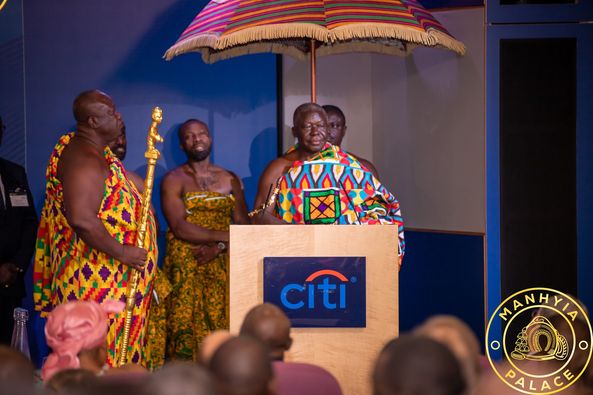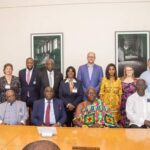Ghana is Far from Where we Deserve- Otumfuo

The Monarch of the Asante Kingdom, Otumfuo Osei Tutu II has expressed concern about the never-ending and yet ever-growing economic plights of Ghana despite its abounding natural resources.
According to him, the country is still far from where it deserves to be.
“In spite of a heritage of incredible natural and human resources, our economy is still wobbly, unable to generate the resources we need to provide for the well-being of the people. Still an astonishing number of people languishing in a poverty trap from which escape is proving almost inseparable.
“This has to be a worry, especially when you consider some of the remarkable achievements of the period,” he said as part of his keynote address at the maiden edition of the Black Heritage Network Symposium hosted by Citibank in the United Kingdom (UK).
Otumfuo noted that despite being advanced from the status of a Heavily Indebted Poor Country (HIPIC) to a middle-income country at the end of the Presidency of H.E. John Agyekum Kufuor, the achievement could not be sustained.
“Understandably, we question our governments and seek answers for the ever-growing social and economic problems afflicting us.”
Where Lies the Problem
Otumfuo in his submission identified the focus on the central government as the enigma to the economic woes of Ghana and Africa at large.
His Majesty conceded that the Private Sector is the engine for growth; however, he noted that the lack of the requisite support for the sector is fueling the sector’s inability to be fruitful and productive to African states.
“In Ghana, after decades of political turmoil, we constructed the Fourth Republic on the proposition that it is not the business of Government to do business. In the hackneyed phrase of our time, the private sector is the engine of growth. But there is the catch. An engine needs fuel and that is not what you draw from the BP retail forecourt. This engine of development needs capital, serious capital, to start and to grow in business.
“And the reality is that it is a commodity in scarce supply not only in Ghana but in most of Africa. In fact, I will argue that given the structure of the global economy today there is no African country, certainly not Ghana, which is in a position realistically to mobilise domestically all the capital it needs for development.”
According to him, multilateral agencies’ focus on resourcing central governments without the corresponding support to the private sector has created a fault line that invariably obstructs the best-conceived policies.
“Yes, our governments need support and it is right they are supported. But to continue to support governments without a corresponding effort to stimulate and sustain the private sector to grow the businesses that will sustain the economy is like applying a sticking plaster to a mortal wound. That, sadly, has been out a lot till now. Think about it. If a country’s private sector is restricted to the misery of commercial shops we see in our high streets, if you are restricted to a mono-crop economy with no industries to add value to your raw materials, where does your government generate the tax revenue to meet the social needs of the people? Where do the products of education find employment to apply the skill sets they have acquired to the service of the country? How does one respond to this?”
The answer, he said lies in migrating focus to retooling the private sector.
“I will suggest that the time has come to move the dial from the rhetoric about the private sector as the engine of growth to the private sector as the driving force of the development agenda. The engine of growth has been without fuel and idle for three decades. It must be replaced with a full complement of entrepreneurs backed by investment capital. This is no idle proposition.”
Manhyia-Citibank Funding Initiative
Otumfuo on that note proposed a collaborative drive between his Palace, Citibank and the Asante Professionals Club to establish a special initiative in creating a well-resourced funding vehicle to boost private sector growth.
This, he noted will be an avenue to create jobs for Ghanaians, create wealth and contribute to the social needs of the country while providing a reasonable return for the investors.
“It is not a plea for charity. It is a plea for mutual prosperity. You are aware of the potential of Ghana and the opportunities open for investment. You have before you also, a cream of highly skilled young men and women primed to take on any task. Between you, I offer the challenge of developing a vehicle that may be a landmark for private sector development. You have the assurance of the full support of the Golden Stool in this endeavour.”
In the long run, the Asantehene anticipates that the wealth gap between the north and south will be closed while migration will be curtailed.
“For every 1000 jobs created by Ghanaian industries, the pressure on migration in Europe or America eases a notch. It may not be the headliner grabber but it is one practical step that can make a difference. And, guess what, if the Ghanaian economy is in great shape, the world can depend on us to share in the burden of supporting those driven by circumstances to seek.”
His Majesty said this while delivering the keynote address at the inaugural Black Heritage Network Symposium hosted by Citibank in the United Kingdom under the theme ‘The Asante Kingdom: Historical Legacy and Its Impact on Modern Economic Development’.
Present were the former President of Ghana, His Excellency John Agyekum Kufuor, Citi Group Chief Client Officer, David Livingstone, and other notable dignitaries, scholars, and business leaders.
The event was used to honour the Asantehene’s contributions and vision for sustainable development, underscoring the importance of the Asante Kingdom’s enduring legacy in the socio-economic fabric of Ghana
Related
Comments are closed.



